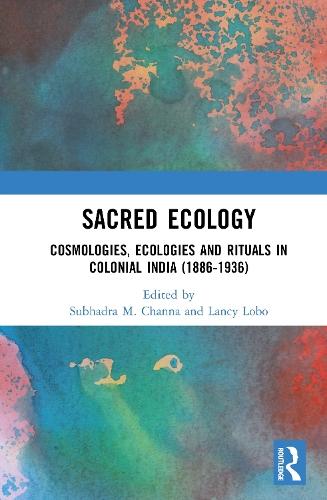Full Product Details
Author: Subhadra M. Channa (New Delhi, India) ,
Lancy Lobo (Centre for Culture and Development, Vadodara)
Publisher: Taylor & Francis Ltd
Imprint: Routledge
Weight: 0.400kg
ISBN: 9781041029694
ISBN 10: 1041029691
Pages: 114
Publication Date: 17 October 2025
Audience:
College/higher education
,
College/higher education
,
Tertiary & Higher Education
,
Tertiary & Higher Education
Format: Hardback
Publisher's Status: Active
Availability: Not yet available

This item is yet to be released. You can pre-order this item and we will dispatch it to you upon its release.
Reviews
'This collection of essays about South Asian nature-related folklore provides an unusually multi-faceted overview of folk wisdom on humanity’s connection with nature. As most of the essays were written in the nineteenth and early twentieth centuries by authors with condescending and positivist points of view, the introduction provides important social and political background for the reader. The collection, however, offers a unique opportunity to understand – and perhaps reclaim – the necessity of water, plants, birds and other animals, and even inanimate parts of nature to human survival.’ Suzanne Hanchett, Ph.D., Planning Alternatives for Change, LLC & International Women’s Anthropology Conference/IWAC; Author of Water Culture in South Asia: Bangladesh Perspectives ‘The vital connection in the Science-Religion-Society triad to build/destroy all in our ‘Earth Home’ significantly permeates this set of purposefully selected and relevant research articles, published nearly a century ago, and hard to come by today. True! They are coloured by a ‘Colonial mindset’ and ‘Western Science’ influence; nevertheless, through narratives (focused on flora and fauna, precious stones, omens and superstitions, figurative stories and myths), and reflections and analysis on them, they present us with the vision, wisdom and world view of a bygone era in which there was resonance and integration between humans and nature. The creative critique in the Introduction to the book enlightens us about the roots of the devastation that the triad continues to inflict today on our ecology. ‘Sacred Ecology in India’ points the way for a better tomorrow.’ Vincent Braganza, S.J., Ph. D, Scientist (Emeritus) and Ex. Chairman, Xavier Research Foundation, Ahmedabad, India
‘This collection of essays about South Asian nature-related folklore provides an unusually multi-faceted overview of folk wisdom on humanity’s connection with nature. As most of the essays were written in the nineteenth and early twentieth centuries by authors with condescending and positivist points of view, the introduction provides important social and political background for the reader. The collection, however, offers a unique opportunity to understand – and perhaps reclaim – the necessity of water, plants, birds and other animals, and even inanimate parts of nature to human survival.’ Suzanne Hanchett, Ph.D., Planning Alternatives for Change, LLC & International Women’s Anthropology Conference/IWAC; Author of Water Culture in South Asia: Bangladesh Perspectives ‘The vital connection in the Science-Religion-Society triad to build/destroy all in our ‘Earth Home’ significantly permeates this set of purposefully selected and relevant research articles, published nearly a century ago, and hard to come by today. True! They are coloured by a ‘Colonial mindset’ and ‘Western Science’ influence; nevertheless, through narratives (focussed on flora and fauna, precious stones, omens and superstitions, figurative stories and myths), and reflections and analysis on them, they present us with the vision, wisdom and world view of a bygone era in which there was resonance and integration between humans and nature. The creative critique in the Introduction to the book enlightens us about the roots of the devastation that the triad continues to inflict today on our ecology. ‘Sacred Ecology in India’ points the way for a better tomorrow.’ Vincent Braganza, S.J., Ph. D, Scientist (Emeritus) and Ex. Chairman, Xavier Research Foundation, Ahmedabad, India
Author Information
Subhadra M. Channa is a retired professor of anthropology from Delhi University. She has twelve books and more than eighty papers to her credit. Her awards include two Fulbright teaching fellowships,Charles Wallace and several visiting professorships, as well as the Distinguished Teacher Award from Delhi University. Presently she is the Co-editor of the journal Reviews in Anthropology. Lancy Lobo was Director of the Centre for Social Studies, based in Surat. He was the founder and director of the Centre for Culture and Development, Vadodara, for 20 years. He was an International Visiting Fellow at the Georgetown University, Washington, DC. He has authored, co-authored, and co-edited 30 books and scores of mimeographs and articles. Currently, Research Director at the Indian Social Institute, Delhi.



